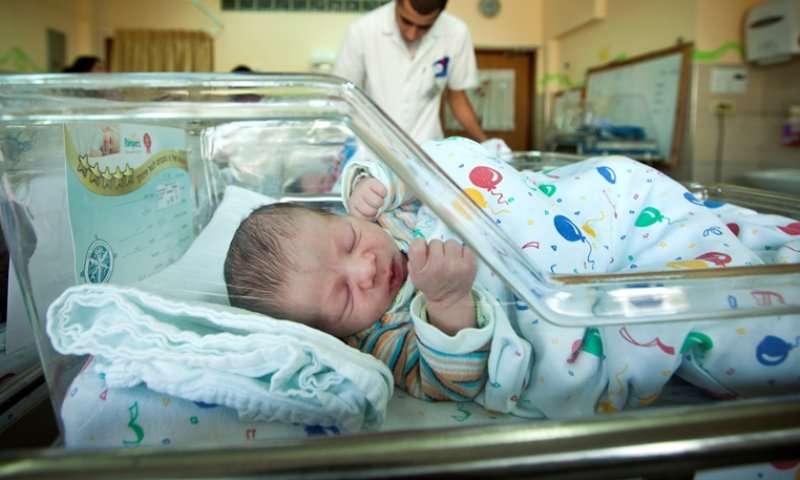
Nurses dangerously understaffed in Israeli Hospitals
“Bechadrei Chareidim” held an exclusive interview with a Chareidi Nurse working in a Yerushalayim hospital revealing that there is a frightening low Nurse-to-patient ratio in Israeli hospitals
- Eli B.
- ט' כסלו התשע"ז

משה שי, פלאש 90
On Novemebe 28, it was reported that a baby went missing in Sharei Tsedek medical center. For almost half an hour the parents and hospital staff franticly searched for the missing infant. B’’H the child was found sound and well in a different women’s arms, unaware that the child she was feeding was not hers.
Many have asked how can such a severe accident take place in a modern-day hospital with so many policies and precautions in place to make sure that something like this does not happen.
“Bechadrei Chareidim” spoke to a chareidi nurse who works in one of Yerushalayims large hospitals to get an understanding of how something like that can happen. Speaking on condition of anonymity the nurse shared with “Bechadrei Chareidim” that “what happened is actually not surprising at all. There is simply not enough man power to assure that something like this does not happen” says the nurse.
Although Israel is well recognized for being very advanced and professional in the field of medicine, when it comes to staffing there is a different picture.
Israel is known to pass many laws each year, yet it does not have any legislation dictating appropriate nurse-to-patient ratios in hospitals. Understandably, each hospital unit requires a different number of nursing staff depending on the size, demand, and acuity of the unit. Being that this is a gray area, each hospital uses their own discretion, and clearly employs the minimum amount of nurses they feel necessary. Unfortunately, since hospitals are economically focused, the less nurse’s they employ the less salaries they have to pay.
“Is this attitude safe? Shouldn’t the hospitals be required by law to supply proper staffing to ensure the safety of the patients?” asks the nurse.
She goes on to describe what the maternity ward looks like on a given day. “On an average shift there are anywhere between 45 and 60 babies, depending on how many births and discharges. Regardless of the number of babies, there are always ONLY two nurses in the evening and night shift. Generally, there is a nurse’s assistant to assist, but she is often called upon to help outside the nursery”.
At a ratio of anywhere between 1:22-30 as described by the nurse it is extremely difficult to provide to patients the care they deserve.
Hospital nurses in Israel are feeling overworked and burned out. They often do not have time for bathroom or eating breaks, let alone to sit down for a few minutes undisturbed. Working under such conditions frightens them of making medication errors and G-D forbid harming a patient. Harming a patient due to negligence is a nurse’s greatest fear.
A lack in proper staffing means there will not always be a nurse at hand to insure that mothers leave the nursery with their own baby.
There is clearly tremendous Siyata Deshmaya, however one may not rely on a miracle.
By Eli B. Co-authored by R.N.
Many have asked how can such a severe accident take place in a modern-day hospital with so many policies and precautions in place to make sure that something like this does not happen.
“Bechadrei Chareidim” spoke to a chareidi nurse who works in one of Yerushalayims large hospitals to get an understanding of how something like that can happen. Speaking on condition of anonymity the nurse shared with “Bechadrei Chareidim” that “what happened is actually not surprising at all. There is simply not enough man power to assure that something like this does not happen” says the nurse.
Although Israel is well recognized for being very advanced and professional in the field of medicine, when it comes to staffing there is a different picture.
Israel is known to pass many laws each year, yet it does not have any legislation dictating appropriate nurse-to-patient ratios in hospitals. Understandably, each hospital unit requires a different number of nursing staff depending on the size, demand, and acuity of the unit. Being that this is a gray area, each hospital uses their own discretion, and clearly employs the minimum amount of nurses they feel necessary. Unfortunately, since hospitals are economically focused, the less nurse’s they employ the less salaries they have to pay.
“Is this attitude safe? Shouldn’t the hospitals be required by law to supply proper staffing to ensure the safety of the patients?” asks the nurse.
She goes on to describe what the maternity ward looks like on a given day. “On an average shift there are anywhere between 45 and 60 babies, depending on how many births and discharges. Regardless of the number of babies, there are always ONLY two nurses in the evening and night shift. Generally, there is a nurse’s assistant to assist, but she is often called upon to help outside the nursery”.
At a ratio of anywhere between 1:22-30 as described by the nurse it is extremely difficult to provide to patients the care they deserve.
Hospital nurses in Israel are feeling overworked and burned out. They often do not have time for bathroom or eating breaks, let alone to sit down for a few minutes undisturbed. Working under such conditions frightens them of making medication errors and G-D forbid harming a patient. Harming a patient due to negligence is a nurse’s greatest fear.
A lack in proper staffing means there will not always be a nurse at hand to insure that mothers leave the nursery with their own baby.
There is clearly tremendous Siyata Deshmaya, however one may not rely on a miracle.
By Eli B. Co-authored by R.N.
תגובות
{{ comment.number }}.
הגב לתגובה זו
{{ comment.date_parsed }}
{{ comment.num_likes }}
{{ comment.num_dislikes }}
{{ reply.date_parsed }}
{{ reply.num_likes }}
{{ reply.num_dislikes }}



הוספת תגובה
לכתבה זו טרם התפרסמו תגובות